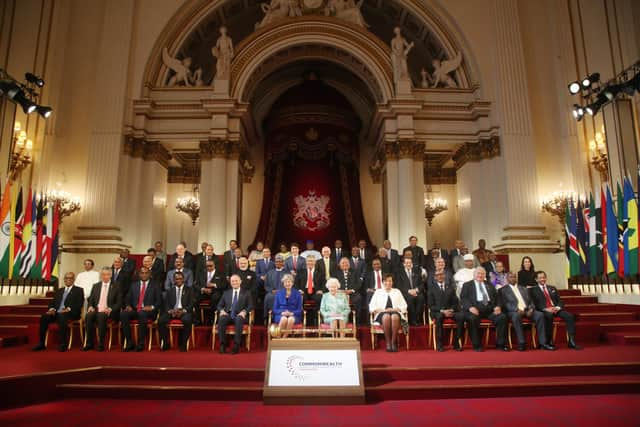Queen Elizabeth helped turn the ruins of British Empire into a unique force for good in the world – Dr Harshan Kumarasingham
However, we know that Elizabeth II believed in the Union. In her Silver Jubilee address at Westminster Hall in 1977 at a time of independence stirrings in Scotland, she reminded her audience of the “benefits which union has conferred… on the inhabitants of all parts of this United Kingdom”.
More recently, four days before the 2014 Scottish independence referendum, outside Crathie Kirk, she stated, “I hope people will think very carefully about the future”, which was rightly interpreted as carefully considered support for the Union.
Advertisement
Hide AdAdvertisement
Hide AdThere was, of course, one other union of nations towards which the Queen was conspicuously biased throughout her 70-year-old reign: the Commonwealth. Had a referendum on the UK’s membership of the Commonwealth ever occurred, there is no doubt which result Elizabeth II would have wanted.
The creation of the modern Commonwealth is one of the most curious and extraordinary developments in world affairs since the end of the Second World War.
The British Empire comprised a third of the globe. Colonialism had been brutal, humiliating and unwelcome to many of those peoples who lived under the Union flag. In reaction, freedom movements proliferated that strongly argued and fought for independence. Almost until the end, this was resisted by Britain, sometimes violently.
The fall of Britain’s Indian Empire, and with it the creation of the independent states of India and Pakistan in August 1947, was a momentous occasion.
Undivided India was the most important possession in the British Empire and its loss signalled the beginning of the end. After years of deep colonialism that inflicted subservience and deprivation on so many people, why would a country such as India join an organisation like the Commonwealth, which was indelibly tied to an empire that caused its subjugation?


Jawaharlal Nehru, the first Prime Minister of India, was a strong believer in internationalism, but the British Commonwealth of Nations, as it was known at the time, was effectively racially exclusive.
Before Nehru and his Pakistani counterpart joined in 1947, there were no non-white Prime Ministers in the group, but Nehru believed that the Commonwealth could be a force for good that could bring to the world “a touch of healing”. It was a sentiment that the Queen unquestionably believed too.
Several leaders from across the old Commonwealth were deeply apprehensive about India’s inclusion for racial and political reasons, but eventually, the advantages were seen. The freedom fighters voluntarily joined the coloniser in what was then, something utterly new.
Advertisement
Hide AdAdvertisement
Hide AdSignificantly, 1947 was also the year when the then Princess Elizabeth pledged in South Africa, on her 21st birthday, to dedicate her life to the “family” of nations that would become the modern Commonwealth. In February 1952, Nehru sent the new Queen a telegram welcoming her as the "new Head of the Commonwealth” and, despite being the only republic in the organisation at the time, India was represented at her Accession Council and coronation.
India’s powerful example would soon be followed by states from across Africa, Asia, the Caribbean and the Pacific, creating a unique, modern organisation built from the ruins of empire. It was to be an eclectic mix of states, freely co-operating “in the pursuit of peace, liberty and progress”.
Margaret Thatcher, many years later, when seeing an independence ceremony on television is said to have remarked, “the poor Queen, do you realise the number of colonies that have been handed over since she came to the throne?” before breaking down in tears.
For Elizabeth II, however, these were not occasions of sorrow, but ones where the Commonwealth grew bigger and wider. Independence leaders as diverse as Lee Kuan Yew, Eric Williams, Kwame Nkrumah, Julius Nyerere, Archbishop Makarios and Kamisese Mara were welcomed by the Queen as friends and family to join those from the “old settler Dominions” like Pierre Trudeau and Malcolm Fraser.
It could have been very different. European empires had ignited hatred and derision from many independence leaders.
King Baudouin of Belgium patronisingly stated in 1960: "The independence of the Congo is the crowning glory of the work conceived by the genius of King Léopold II.” The original Belgian colonisers, he told his Congolese audience, “deserve admiration from us and acknowledgement from you… it is now up to you, gentlemen, to show that you are worthy of our confidence.” Patrice Lumumba, knowing first hand the brutality of colonialism, reportedly said "we are your monkeys no longer”.
The African National Congress was banned the same year by the apartheid regime in South Africa and Nelson Mandela not long after would face 27 years’ imprisonment for his political activism fighting for Black rights.
When he emerged to lead South Africa in 1994, he ensured that his country re-joined the Commonwealth – today with 56 members – after it had withdrawn in 1961 due to pressure from members over its apartheid policy.
Advertisement
Hide AdAdvertisement
Hide AdThat Mandela did this despite the terrible colonial history of South Africa says something of the Commonwealth and the person he called "Motlalepula” – the one who brings rain – perhaps indicating the way Elizabeth II had brought a new climate of multi-cultural community after the winter of empire.
As the Queen declared during the Silver Jubilee of 1977, she herself had witnessed, “from a unique position of advantage… the last great phase of the transformation of the empire into Commonwealth and the transformation of the crown from an emblem of dominion into a symbol of free and voluntary association. In all history, this has no precedent.”
This remains so, 75 years after Queen Elizabeth II made her pledge in South Africa.
Dr Harshan Kumarasingham is a senior lecturer in British politics at the University of Edinburgh
Comments
Want to join the conversation? Please or to comment on this article.